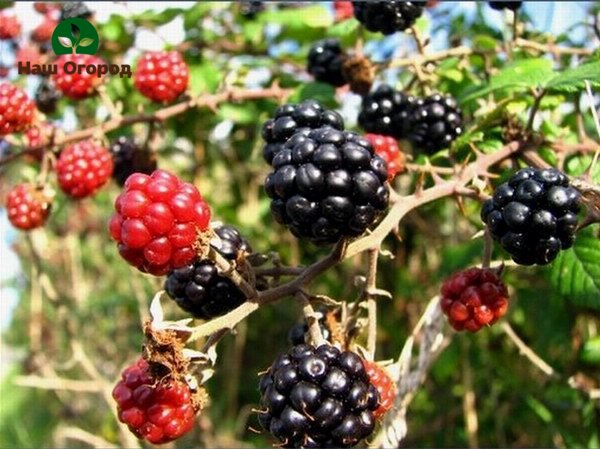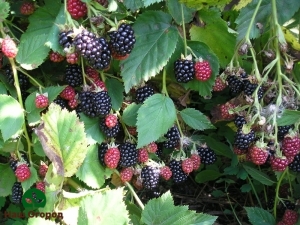Can raspberries and blackberries grow next to each other? We reveal all the secrets
Content:
Raspberries and blackberries: useful properties of berries
Raspberries are one of the permanent residents of most summer cottages. In Russia, this berry has been grown since the 17th century. Blackberry began to be domesticated as much as 2 centuries later. Perhaps that is why she delayed a little on the way to our gardens.
But blackberries are no less useful than raspberries. And by the amount of vitamins and microelements it is not inferior to its "relative". For example, the berries of both crops are rich in magnesium, which is necessary for the proper functioning of the cardiovascular system, and lutein, a substance that protects the body from the development of cancer cells. These berries are allowed for diabetes mellitus, since they have a low glycemic index and calorie content.
Blackberries have a nice taste with a little sourness, but imagine how they would complement sweet raspberries.
If you decide to grow blackberries, and the area of the site does not allow you to allocate a separate area for planting it, this crop can be quite "attached" to raspberries, because the requirements for growing conditions are very similar.
Growing conditions for berries
Both crops require moderate soil moisture for proper growth and development, especially during the period of formation and ripening of berries. At the same time, the soil should be water-absorbing and rather loose so that water does not stagnate in the root system, preventing the flow of air to the roots. Therefore, it is better to plant both raspberries and blackberries in areas with a groundwater level of no more than 1.5 meters.
Plant shoots can be damaged by strong winds. And when dried and broken, they are unlikely to winter well. In this regard, it is better to plant both berries at a distance from wind-blown places.
In addition, when deciding on a landing site, it is important to consider predecessors and neighbors. Both berry crops should not be planted after apple, tomato, strawberry, eggplant, or next to these plants.
When planting berries, the distance between the plants should be at least 50 cm, and between the rows - at least 2 meters, otherwise leaving and picking berries will be difficult, since both crops are quite thorny. Rows can be limited trellises, on which it will be convenient to fix the shoots in the summer.
Berry care and disease prevention
Compulsory in the care of berry crops is loosening the soil and weeding. It is necessary to loosen the soil carefully so as not to damage the surface roots of the plants. To prevent the growth of weeds, the ground near the bushes can be mulched. This will also allow you to maintain the required soil moisture level for longer.
In addition, at the beginning of the growing season, both plants are responsive to nitrogen fertilization. At the same time, from the second half of July, it is better to stop nitrogen-containing fertilizing so that the plant has time to prepare for winter. Many gardeners mulch the soil around the bushes with humus or compost, and with each watering the plants receive additional organic fertilizers.
There is an opinion that it is impossible to overfeed raspberries. It is recommended to feed it both during and after flowering, as well as in autumn to ensure good development of fruit buds of the future harvest. It is advised not to be zealous with feeding blackberries. The soil for blackberries must be fertilized before planting, and then fertilized at the beginning of flowering.
A similar point in caring for berries is the need for their thinning, pruning, since both crops give a lot of shoots, shoots.

For example, extra shoots and young growth are removed from raspberries, which take away nutrition and reduce the yield of berries. In blackberries, shoots are cut from which they have already harvested, since a blackberry shoot bears fruit for one season. This berry crop with a two-year cycle - in the first year the shoot grows, in the second year it bears fruit. If thinning and pruning are not carried out, the plants will shade themselves. Lack of light will affect the size and flavor of the berries.
It should be noted that planting thinning is also one of the ways to prevent diseases. Thickened plantings are poorly ventilated, which contributes to the development of infectious diseases and creates favorable conditions for the reproduction of pests.
Pests of blackberries and raspberries are common, therefore, the methods of prevention and control of them are one for two. It should be noted that preventive measures taken on a regular basis significantly reduce the likelihood of infection of plants and the appearance of pests, which will most likely have to be dealt with with chemicals. For example, gardeners practice spraying raspberries and blackberries with infusions of nettle, horsetail, which have insecticidal and fungicidal properties. And infusions of ash and tobacco are good at scaring away insects - carriers of diseases.

Thus, blackberries and raspberries may well grow side by side and give good yields, it is only necessary to comply with the conditions for their cultivation, as well as to provide correct and timely care. By the way, their neighborhood does not affect the quality of the fruits, since cross-pollination does not threaten these berry crops.

